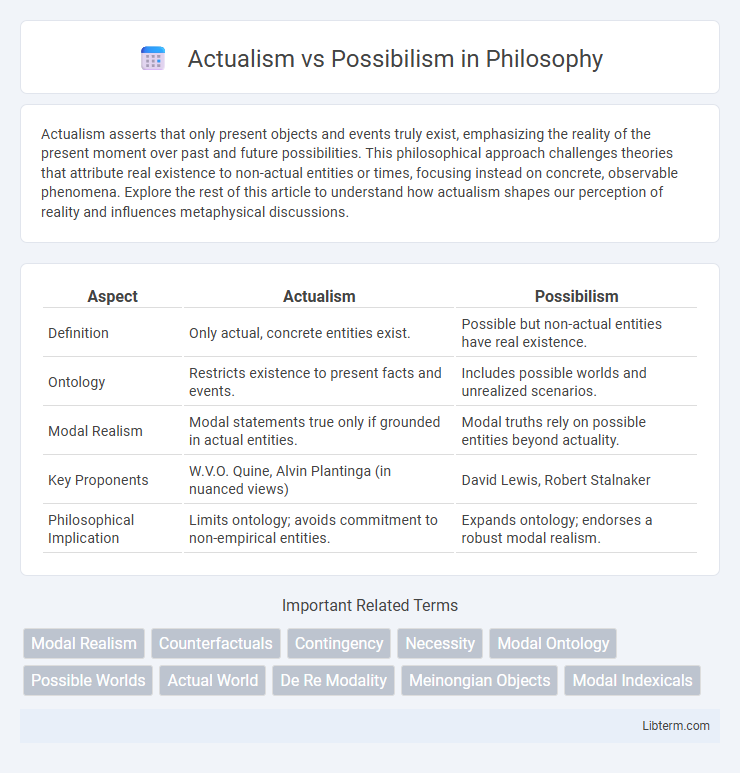Actualism asserts that only present objects and events truly exist, emphasizing the reality of the present moment over past and future possibilities. This philosophical approach challenges theories that attribute real existence to non-actual entities or times, focusing instead on concrete, observable phenomena. Explore the rest of this article to understand how actualism shapes our perception of reality and influences metaphysical discussions.
Table of Comparison
| Aspect | Actualism | Possibilism |
|---|---|---|
| Definition | Only actual, concrete entities exist. | Possible but non-actual entities have real existence. |
| Ontology | Restricts existence to present facts and events. | Includes possible worlds and unrealized scenarios. |
| Modal Realism | Modal statements true only if grounded in actual entities. | Modal truths rely on possible entities beyond actuality. |
| Key Proponents | W.V.O. Quine, Alvin Plantinga (in nuanced views) | David Lewis, Robert Stalnaker |
| Philosophical Implication | Limits ontology; avoids commitment to non-empirical entities. | Expands ontology; endorses a robust modal realism. |
Understanding Actualism: Core Concepts
Actualism asserts that only present and actual entities truly exist, emphasizing reality as confined to what is concretely instantiated. It rejects the existence of merely possible worlds or entities, considering them as conceptual tools rather than ontological commitments. This perspective centers on the actuality of existence, making it crucial for metaphysical discussions on the nature of being and existence.
Defining Possibilism: An Overview
Possibilism in philosophy emphasizes the existence of multiple potential realities shaped by human choices and actions, contrasting with actualism, which asserts that only actual events or states of affairs are real. This view supports the exploration of possible worlds as legitimate ontological entities, acknowledging alternative outcomes and future possibilities as meaningful. Possibilism plays a crucial role in modal logic, decision theory, and metaphysics by framing possibilities as concrete alternatives rather than mere abstractions.
Historical Origins of Actualism and Possibilism
Actualism, emerging in early 20th-century philosophical discourse, traces its origins to the works of philosophers like Aristotle and Duns Scotus, emphasizing the reality of actual entities and events. Possibilism gained traction through Leibniz and later modal logicians, highlighting the ontological status of possible worlds as indispensable for understanding modality. Both concepts evolved through medieval scholasticism and modern analytic philosophy, shaping debates on existence, modality, and metaphysical realism.
Key Philosophical Differences
Actualism asserts that only actual, concrete entities exist, emphasizing the reality of the present world and denying the existence of merely possible objects, while Possibilism holds that possible entities have a form of existence independent of actual reality. The key philosophical difference lies in their stance on modality: Actualism restricts truth claims about possibilities to actual entities, whereas Possibilism affirms the ontological status of possible worlds or potential beings. This divergence affects debates in metaphysics regarding the nature of existence, truth conditions of modal statements, and the interpretation of necessity and possibility.
Applications in Ethics and Moral Decision-Making
Actualism in ethics emphasizes evaluating actions based on actual outcomes and real-world circumstances, leading to decision-making focused on the consequences that will genuinely occur. Possibilism considers all possible outcomes, including hypothetical scenarios, thereby encouraging moral evaluations that account for potential consequences regardless of their likelihood. These contrasting approaches influence frameworks in moral philosophy, with actualism often guiding practical ethics and possibilism underpinning more theoretical assessments of moral responsibility.
Implications for Metaphysics
Actualism holds that only actual, concrete entities exist, thereby rejecting the reality of merely possible worlds and limiting ontological commitments to what is empirically instantiated. Possibilism, in contrast, asserts that possible entities and worlds possess genuine ontological status, expanding the metaphysical framework to include non-actualized possibilities as real. This divergence influences debates on modality, causation, and the nature of existence, shaping the scope of metaphysical inquiry and the interpretation of necessity and possibility.
Actualism and Possibilism in Everyday Reasoning
Actualism in everyday reasoning emphasizes considering only the outcomes and possibilities that are concretely realizable based on current facts, while Possibilism allows for hypothetical scenarios and potential futures beyond immediate actual conditions. This distinction influences decision-making by prioritizing actual states and known information in Actualism, contrasting with Possibilism's broader scope that incorporates uncertain or speculative options. Understanding both frameworks enhances critical thinking by balancing practical constraints with imaginative foresight in daily judgments.
Criticisms and Controversies
Actualism faces criticism for potentially disregarding the modal reality of possible worlds, limiting consideration to only what is actual and thereby constraining metaphysical and epistemological frameworks. Possibilism encounters controversy for its expansive ontology that posits the real existence of all possible entities, which some argue leads to ontological inflation and challenges in distinguishing between actuality and mere possibility. Both positions provoke debates on the nature of existence and the implications for modal logic, metaphysics, and the philosophy of time.
Contemporary Debates and Developments
Contemporary debates in actualism vs possibilism center on the ontological status of possible worlds, with actualists asserting only the actual world's concrete existence while possibilists grant a form of reality to non-actual possible worlds. Developments in modal logic and metaphysics explore refined criteria for evaluating the truth conditions of modal statements, often employing counterpart theory and modal realism to address challenges posed by vague or indeterminate possibilities. Recent philosophical discourse integrates insights from cognitive science and linguistics to assess how human understanding of modality influences the plausibility of either position within modal metaphysics.
Conclusion: Actualism vs Possibilism—Future Perspectives
Actualism emphasizes that only events and entities that actually occur are real, restricting ontology to the present and past facts. Possibilism allows for the existence of all possible entities and outcomes, broadening the metaphysical scope to include potential futures. Future perspectives suggest a growing interest in hybrid theories that integrate actualist ontology with possibilist modal logic to better address open scientific and philosophical questions about contingency and determinism.
Actualism Infographic

 libterm.com
libterm.com